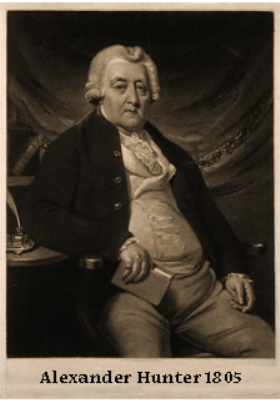Alexander Hunter facts for kids
Dr. Alexander Hunter (born 1729, died May 17, 1809) was a Scottish doctor. He was also well-known as a writer and editor. He became a member of important groups like the Royal Society of Edinburgh and the Royal Society of London.
Dr. Hunter's Life Story
Alexander Hunter was born in Edinburgh, Scotland, in 1729. He was the oldest son of a wealthy druggist, who sold medicines.
When he was 10, he went to a grammar school. From age 15 to 21, he studied at the University of Edinburgh. For the last three years, he focused on medicine. After that, he spent a couple of years studying in London, Rouen, and Paris. He returned to Edinburgh and earned his medical degree (MD) in 1753.
He first worked as a doctor in Gainsborough and then in Beverley. In 1763, he moved to York and worked there until he passed away in 1809.
In 1772, Dr. Hunter helped create the York Lunatic Asylum. This was a special hospital for people with mental health issues. The building was finished in 1777. Dr. Hunter worked as a doctor there for many years.
He was chosen to be a Fellow of the Royal Society in London in 1777. Later, in 1792, he became a Fellow of the Royal Society of Edinburgh. He was also made an honorary member of the Board of Agriculture.
Dr. Hunter died in York on May 17, 1809. He was buried in the churchyard of St Michael le Belfrey, York.
Dr. Hunter's Books and Ideas
Dr. Hunter's first book was a small guide in 1764. It was called 'Essay on the Nature and Virtues of the Buxton Waters.’ This book was very popular and was printed six times. The last version came out in 1797. In 1806, he wrote a similar book about the 'Waters of Harrowgate.’
He also helped start the Agricultural Society in York in 1770. He encouraged members to write down their ideas about farming. He collected these writings into four books called 'Georgical Essays.’ These books were about things like plant food and compost. They were so well-liked that they were printed three more times. In 1796, he published 'New Method of Raising Wheat.' This book shared a new way to grow wheat on the same land for many years.
Dr. Hunter was very interested in farming and nature. He created a special edition of John Evelyn's famous book, Sylva. This book was about forest trees and growing timber. Dr. Hunter added his own notes and pictures to it in 1776. He also edited Evelyn's Terra in 1778.
In 1795, he wrote a short book called 'Outlines of Agriculture.' He also wrote about the similarity between how plants and animals give birth in 1797.
He wrote a paper about how to cure consumption, a lung disease. He also wrote a cookbook called 'Culina Famulatrix Medicinæ,’ which means 'Cookery, the Handmaid of Medicine.' It was first published in 1804 and was very popular. Later, it was renamed 'Receipts in Modern Cookery.'
One of his last and most famous works was a collection of wise sayings. It was called 'Men and Manners; or Concentrated Wisdom.' This book had many short, wise ideas and was printed several times.
Dr. Hunter's Family Life
Dr. Hunter was married two times. His first wife was Elizabeth Dealtry. They married in 1765 and had one daughter and two sons. Elizabeth passed away around 1798.
In 1799, he married Anne Bell. She lived longer than he did.
 | Toni Morrison |
 | Barack Obama |
 | Martin Luther King Jr. |
 | Ralph Bunche |


